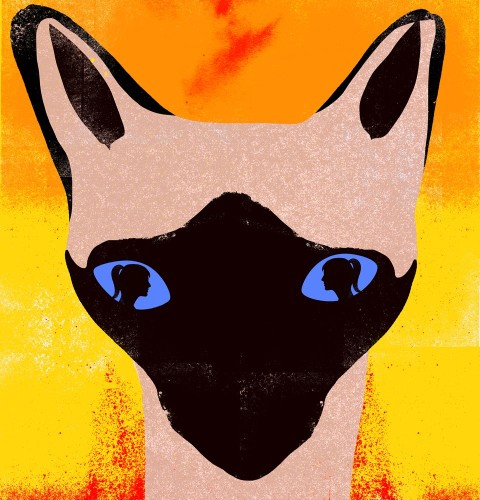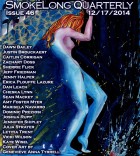The yellow wall and a window—the light filtering through is a deep blue. A lamp shaped like two Siamese cats, shoulder to shoulder sits on the sill. When the lamp is plugged in the cats’ eyes light up. Jocelyn has been spooked by the light on certain late nights, turning the corner and catching their laser eyes drilling through her. Hand to heart. Pounding.
Jocelyn walks through the woods in the early morning. The mist and dew settled all around. Squeaky sneakers slush through the tall grasses. The trees soar up—sentries, calm and cool. She stops to pick at their bark and listens to the sleepy birds just getting wound up with their shrill one-note whistles and tiny tweet-tweet-tweets, and then continues on her way.
Up ahead, she sees red and black flannel, someone in jeans walking along, which is rare this early. Jocelyn has become interested in mosses and has strayed from the trail to climb a large rock with frilly, lacy green lining its top and side. It’s like carpet and she daydreams about moving into the forest. Somehow building a house that has trees coming up through it and moss carpet to dig her toes into. She knows it can be done. She’s seen pictures in magazines.
From atop the rock the flannel moves slowly, examining this and that. It’s another woman, older than Jocelyn. Gray hair pulled back into a ponytail. She carries a little box, like a silver lunchbox, at her side. Wears hiking boots.
Jocelyn wants to call out in comradery. But what would she say? “I like the woods too!” “Hey, isnt nature cool?” But she can’t do that because she knows halfway-to-crazy and can keep it in check. So, instead she spies on the woman as she makes her way along the trail that edges the ridge. Like a sniper, she watches, stays quiet. Wishes she owned a dog that would bark right about now. Jocelyn fingers the cool, soft moss—pushes it this way and that.
After her morning walk she dresses like a normal person and heads to an inconsequential office on the 5th floor of the historic Rayne’s building downtown. There, Jocelyn answers the phone and organizes her boss’s life. Sometimes she picks up Mr. Snyders dry cleaning. She doesn’t mind. She’s good at keeping everything running smoothly, and they both know it. In fact, all the employees buy her snacks and gifts and flowers and secretly pray she will never ever quit because the company will surely be up shit’s creek without her. Jocelyn smiles and wields the small saber of power she has accrued. She types, files, brews coffee, organizes the yearly CPR refresher, and then she heads home to her tiny house in the woods that she has managed to own outright. She plugs in the cat lamp. Makes dinner for one.
The green tub, a clawfoot she pulled from the dump and restored. She doesn’t have a shower and so bathing is an everyday luxury. There’s a small ivy plant hung above the tub nestled into a bright blue pot and slung into a macram holder. When she’s in the tub, water steaming all around her, candles lit, bath salts dissolved, she feels like she’s at the exact center of the world. Jocelyn tunes her radio to the classical station, keeps it turned low. No one knows where she is right now. No one.
Jocelyn looks for the woman as she walks the ridge trail, strays off her normal course. It’s early again, nearly 5am and steam shoots from her mouth as she leans upward pressing herself toward the place where there’s a view. She can see her whole town from there, asleep, waiting for her to organize it. Jocelyn thinks about the woman from the day before. Maybe she wasn’t real and instead she was her own future.
It made sense. She’d grow her hair long, let it go gray, pull it back in a ponytail. But why the lunchbox? Jocelyn couldn’t quite figure that one. A snack for the hike? Spare socks?
The box swings by her side with each long step, the cool metal chilling her when it brushes her skin. The heft of it swings the box naturally forward and back. It’s heavy, like a brick. Like the ashes of a dead dog.
Her dog, who barked at leaves and scampered joyously in front of her, has died and it breaks her heart into pieces. She has it cremated and places the ashes in her father’s old lunchbox, the one he carried to the mill every single day of his working life.
She gets up early, like always, carries the dog’s ashes to the ridge. She strays off the trail. She opens up the box and scatters the too-heavy gray ash everywhere. She knows it’s the right thing to do. The ashes carry on the breeze like morning birdsong as she senses someone watching her.



 The SmokeLong Grand Micro Contest (The Mikey) is now an annual competition celebrating and compensating the best micro fiction and nonfiction online.
The SmokeLong Grand Micro Contest (The Mikey) is now an annual competition celebrating and compensating the best micro fiction and nonfiction online.